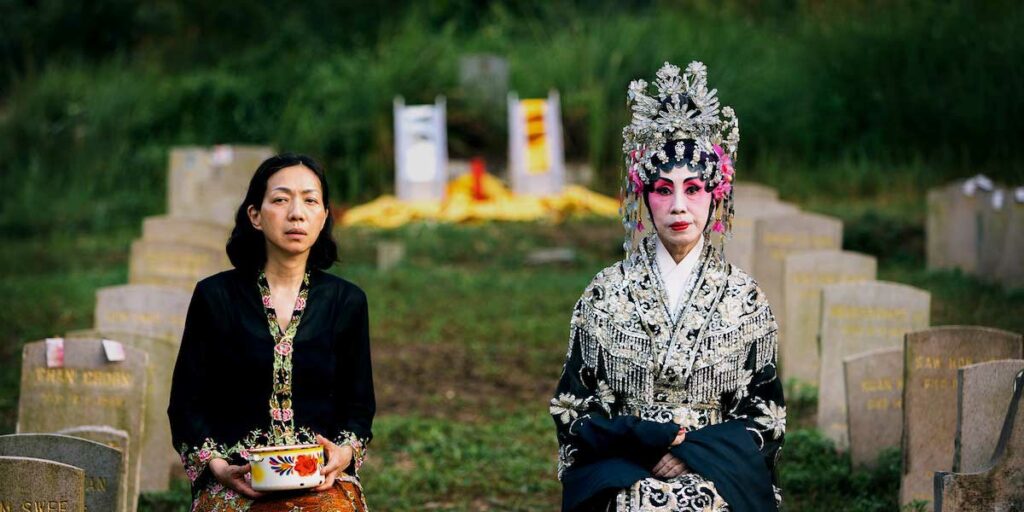With its reflection on the past, Keat Aun Chong’s Snow in Midsummer (Wu Yue Xue) delivers a painful portrayal of injustice.
At the beginning of Snow in Midsummer (Wu Yue Xue), we hear one of the characters say, “the heavens must be furious to have caused such a snowstorm in June.” Throughout the film, the idea of snow falling in June comes back multiple times through various characters, always tied to a sense of great injustice. The phrase “snowing in June” is still currently used in this sense in Chinese, as a metaphor to indicate a wrongdoing or miscarriage of justice. The common phrase among Chinese speakers comes from “Dou E Yuan,” also known as the titular “Snow in Midsummer,” a Chinese play written by Guan Hanqing, which is directly referenced in this movie as it opens on the Chinese street opera performing this play.
Written and directed by Keat Aun Chong, Snow in Midsummer does tell the story of injustice and suffering, as its name suggests, but one that has deep roots in the history of Malaysia. On 13th May 1969, Ah Eng (Wan Fang) and her mother (Pauline Tan) are at a Temple in Kuala Lumpur to watch the Chinese opera. Amid post-election unrest, a violent riot erupts in Kuala Lumpur, which led to retaliation from the government. Eng and her mother take shelter and hide with the theatre troupe, losing contact with her brother and father. On 13th May 2018, an adult Eng is now looking for the graves of those who lost their lives 49 years before, having a moment of remembrance of her childhood.
As I watched Snow in Midsummer, the sound design and music by Yii Kah Hoe and Chong Keat Aunn stood out in particular throughout the film. For a movie that focuses on telling such a brutal act as the riots in 1969 in Malaysia, it manages to show surprisingly little violence. Instead, that is conveyed through the diegetic music which quickly becomes sombre and ominous as Eng and her mother find themselves in the midst of the riot breaking out in the city.

While the characters witness the horror of this violence, the audience only sees their reactions. Snow in Midsummer chooses to show the characters themselves rather than what they see and focuses on the sounds of the riot and auditory elements. Whether it is the radio announcing the state of emergency, dogs barking, bullets fired, or hearing people screaming, the sound is a key component in the film in order to convey the chaos and turmoil that Eng and her mother experienced on 13th May 1969.
That is not to say that Snow in Midsummer is not impressive visually. The camerawork and cinematography by Hsu Chih-Chun are also incredibly striking and successful in portraying the eerie and suspenseful atmosphere of the night of the riots. I appreciated how the film does not shy away from slower moments. It is not afraid to pause and spend the necessary time on its scenes, on a character parading into an empty neighbourhood, or on the characters sitting in the dark while waiting for future developments. In some ways, these aesthetic choices reminded me of the lingering shots Italian neorealism is known for. This may also be the reason why the film consistently feels so authentic and raw.
The film is admittedly quite slow, and sometimes hard to follow for those who may not be familiar with the historical event Snow in Midsummer portrays in the first half of its narrative. But the movie does not necessarily have to be educational just because of its historical context: ultimately, we can pick up on the necessary elements to understand the film, albeit some of the nuances and details may be missed. It is even more effective precisely because it’s a movie that focuses on portraying a story rather than teaching the audience something.
Undoubtedly, Snow in Midsummer is going to be more impactful for those in the audience who know about the May 13 acts of violence in Kuala Lumpur and may have a strong cultural memory of the event. Nonetheless, the impressive sound design and camerawork allow us to sympathize with this historical event through the eyes of the main character. The film is heartbreaking in its recollection of such a significant moment in Malaysian politics, one that the general public should know more about since it has such an impact on our present, as the film so brilliantly shows us with its time jump to 2018.
Snow in Midsummer (Wu Yue Xue) premiered at the 2023 Venice Film Festival on September 4, 2023.

